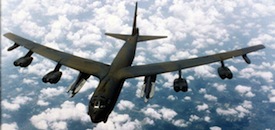Nuclear Posture Review Release Delayed Until March
January 6, 2010
Featured Image
Pentagon: Obama's Nuke Strategy Delayed - Foreign Policy's The Cable [link]
- The Obama administration's rollout of its new nuclear strategy will be delayed until March, the Pentagon told Congress last week.
- But arms-control advocates see the delay as not so surprising (what review isn't delayed in Washington?) and they argue that the postponement will give the administration more time to give the NPR the senior-level attention it deserves.
- "It's not particularly surprising. I believe it's due to the fact that principals haven't been able to really dig in to the substantive issues of the NPR," said Daryl Kimball, executive director of the Arms Control Association.
More Fear Mongering From The Right - Max Bergmann in Think Progress' The Wonk Room [link]
- Just when you thought the current level of right-wing fear mongering couldn’t get any worse, the Wall Street Journal writes an editorial about nuclear weapons.
- Did you know that while you were sleeping, America’s vast and technological advanced nuclear arsenal was rapidly deteriorating? It cites the Perry-Schlesinger commission as evidence to make this point, which should be news to the Perry-Schlesinger commission since the Commission’s report never makes this point.
- Our nuclear arsenal is not deteriorating. We spend billions on programs to ensure the reliability of the US nuclear arsenal. The Wall Street Journal and Senators like Jon Kyl seem to not have read or are just choosing to ignore the JASON report – a report from independent scientists tasked with assessing the US nuclear force.
- In other words, what we are doing right now to maintain are nuclear weapons is working and we don’t need new warheads.
- Note: For additional rebuttals of the Wall Street Journal editorial, please see Nukes of Hazard and Democracy Arsenal.
Iran Shielding Its Nuclear Efforts in Maze of Tunnels - The New York Times [link]
- Last September, when Iran’s uranium enrichment plant buried inside a mountain near the holy city of Qum was revealed, the episode cast light on a wider pattern: Over the past decade, Iran has quietly hidden an increasingly large part of its atomic complex in networks of tunnels and bunkers across the country.
- In doing so, American government and private experts say, Iran has achieved a double purpose. Not only has it shielded its infrastructure from military attack in warrens of dense rock, but it has further obscured the scale and nature of its notoriously opaque nuclear effort.
- Iran says it wants to build many enrichment plants to fuel up to 20 nuclear power plants, a plan many economists question because Iran ranks second globally in oil and natural gas reserves.
- Ploy or not, any expansion seems unlikely to zoom ahead. After a decade of construction, Iran’s main enrichment plant, at Natanz, operates at a tiny fraction of its capacity. The Qum plant is only half built. Nuclear experts say the new plants, if attempted, may not materialize for years or decades. Even so, they note that tunnels would be the easiest part of the plan and may get dug relatively soon.
- However, according to Raymond Tanter, an Iran expert at Georgetown University who served in the Reagan White House, “So far, the tunneling has not succeeded to the point that the American technology couldn’t get to it,” he contended. “But it makes Israel’s options more problematic, because they have less of a military edge.”
A Radioactive Situation - Mark Hibbs in Foreign Policy [link]
- As Yukiya Amano takes the helm at the International Atomic Energy Agency, he must contend with escalating conflicts in Iran and Syria, sharp divides among nations on the Board of Governors -- and the long shadow cast by his predecessor.
- An early indicator of how far Amano is willing to depart from his predecessor's approach will come in mid-February, when he will finish drafting reports on Iran and Syria for the board.
- As Amano attempts to step out of the long shadow cast by ElBaradei, he will be judged by his ability to re-establish the tradition of consensual governance that characterized the IAEA during most of its half century of existence.
A View from the Dark Side
Obama's Nuclear Dream Could Endanger America - The Heritage Foundation's Blog "The Foundry" [link]
- According to a January 4 report in the Los Angeles Times, President Obama’s plan for nuclear disarmament is meeting opposition from the Department of Defense. Specifically, the Department of Defense believes that President Obama’s plan jeopardizes U.S. security. They are right.
- First and foremost, the American people need to understand that U.S. nuclear forces and the infrastructure to support them have been atrophying since the end of the Cold War. Meanwhile, China and Russia are modernizing their nuclear forces and Iran and North Korea are looking to become de facto nuclear weapons states. From outward appearances, President Obama wants to atrophy the U.S. nuclear force out of existence by continuing on the path to decline.
- Note: Please see Kingston Reif's article, "Nuclear Weapons: The Modernization Myth" in the Bulletin of the Atomic Scientists, for the real facts on the state of the U.S. nuclear arsenal.



